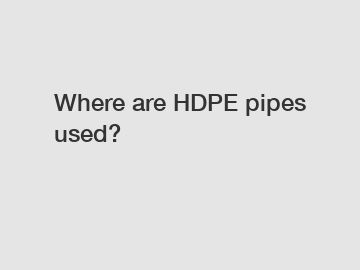Where are HDPE pipes used?
HDPE pipes, or high-density polyethylene pipes, are a popular choice in various industries due to their durability and versatility. These pipes are made from a thermoplastic polymer that is known for its high strength-to-density ratio, making it suitable for a wide range of applications. From water supply systems to industrial piping, HDPE pipes are used in a variety of settings. In this article, we will explore where HDPE pipes are commonly used and the benefits they offer.
**Water Supply Systems**.
One of the most common uses of HDPE pipes is in water supply systems. HDPE pipes are ideal for potable water applications because they are resistant to corrosion and do not leach harmful chemicals into the water. These pipes can withstand high pressure and are flexible enough to be installed in a variety of environments, including underground and underwater. Additionally, HDPE pipes have a smooth surface that prevents the buildup of sediment and biofilm, ensuring clean and safe drinking water for consumers.

**Wastewater Management**.
In addition to water supply systems, HDPE pipes are also used in wastewater management. These pipes are resistant to the chemicals and abrasives found in wastewater, making them a durable and long-lasting solution for sewer lines and drainage systems. HDPE pipes are lightweight, making them easy to transport and install, which can reduce installation time and costs. With their leak-proof joints and resistance to root intrusion, HDPE pipes are a reliable choice for wastewater infrastructure.
**Industrial Piping**.
HDPE pipes are widely used in industrial piping applications due to their chemical resistance and high-temperature tolerance. These pipes can handle a variety of substances, including acids, alkalis, and solvents, making them suitable for transporting chemicals in industrial settings. HDPE pipes are also commonly used in mining operations, power plants, and oil and gas refineries due to their ability to withstand harsh conditions and corrosive substances. Additionally, HDPE pipes are lightweight and flexible, making them easier to transport and install in industrial environments.
**Agricultural Irrigation**.
In the agricultural sector, HDPE pipes are used for irrigation systems due to their resistance to chemicals and UV exposure. These pipes can withstand harsh environmental conditions, such as exposure to sunlight and fluctuating temperatures, making them ideal for agricultural applications. HDPE pipes are also flexible and easy to install, allowing for efficient water distribution in irrigation systems. With their long lifespan and low maintenance requirements, HDPE pipes are a cost-effective solution for agricultural irrigation projects.
**Conclusion**.
In conclusion, HDPE pipes are versatile products that can be used in a wide range of applications, from water supply systems to industrial piping and agricultural irrigation. Their durability, chemical resistance, and flexibility make them a popular choice for various industries. Whether you need a reliable solution for transporting water, wastewater, chemicals, or irrigation, HDPE pipes can meet your needs. Contact us to learn more about how HDPE pipes can benefit your next project.
**Contact Us**.
For more information on HDPE pipes and their applications, please contact us. Our team of experts can provide guidance on choosing the right pipes for your specific needs.
If you are looking for more details, kindly visit used bucking machine for sale, casing thread protector, 2 axis cnc lathe machine.

Comments